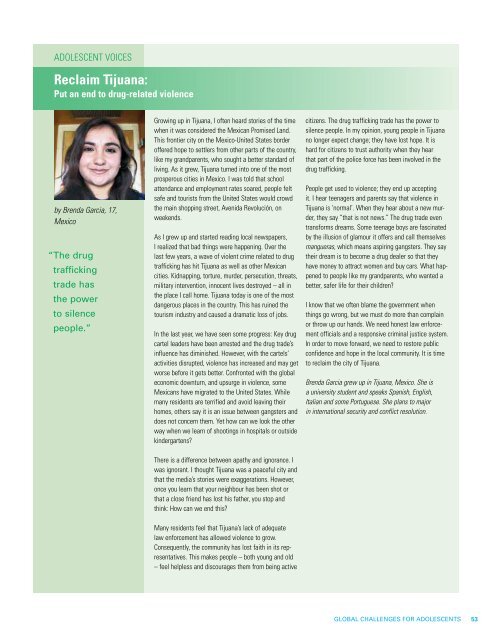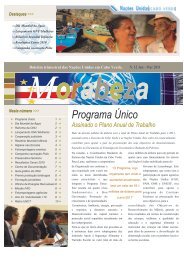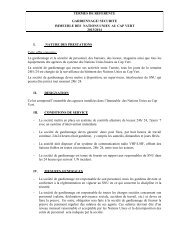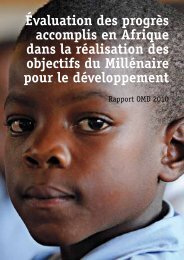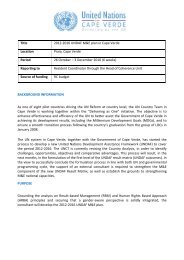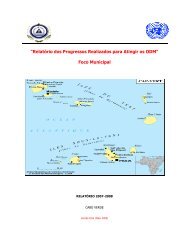Adolescence
Adolescence
Adolescence
- No tags were found...
You also want an ePaper? Increase the reach of your titles
YUMPU automatically turns print PDFs into web optimized ePapers that Google loves.
ADOLESCENT VOICESReclaim Tijuana:Put an end to drug-related violenceby Brenda Garcia, 17,Mexico“ The drugtraffickingtrade hasthe powerto silencepeople.”Growing up in Tijuana, I often heard stories of the timewhen it was considered the Mexican Promised Land.This frontier city on the Mexico-United States borderoffered hope to settlers from other parts of the country,like my grandparents, who sought a better standard ofliving. As it grew, Tijuana turned into one of the mostprosperous cities in Mexico. I was told that schoolattendance and employment rates soared, people feltsafe and tourists from the United States would crowdthe main shopping street, Avenida Revolución, onweekends.As I grew up and started reading local newspapers,I realized that bad things were happening. Over thelast few years, a wave of violent crime related to drugtrafficking has hit Tijuana as well as other Mexicancities. Kidnapping, torture, murder, persecution, threats,military intervention, innocent lives destroyed – all inthe place I call home. Tijuana today is one of the mostdangerous places in the country. This has ruined thetourism industry and caused a dramatic loss of jobs.In the last year, we have seen some progress: Key drugcartel leaders have been arrested and the drug trade’sinfluence has diminished. However, with the cartels’activities disrupted, violence has increased and may getworse before it gets better. Confronted with the globaleconomic downturn, and upsurge in violence, someMexicans have migrated to the United States. Whilemany residents are terrified and avoid leaving theirhomes, others say it is an issue between gangsters anddoes not concern them. Yet how can we look the otherway when we learn of shootings in hospitals or outsidekindergartens?There is a difference between apathy and ignorance. Iwas ignorant. I thought Tijuana was a peaceful city andthat the media’s stories were exaggerations. However,once you learn that your neighbour has been shot orthat a close friend has lost his father, you stop andthink: How can we end this?citizens. The drug trafficking trade has the power tosilence people. In my opinion, young people in Tijuanano longer expect change; they have lost hope. It ishard for citizens to trust authority when they hearthat part of the police force has been involved in thedrug trafficking.People get used to violence; they end up acceptingit. I hear teenagers and parents say that violence inTijuana is ‘normal’. When they hear about a new murder,they say “that is not news.” The drug trade eventransforms dreams. Some teenage boys are fascinatedby the illusion of glamour it offers and call themselvesmangueras, which means aspiring gangsters. They saytheir dream is to become a drug dealer so that theyhave money to attract women and buy cars. What happenedto people like my grandparents, who wanted abetter, safer life for their children?I know that we often blame the government whenthings go wrong, but we must do more than complainor throw up our hands. We need honest law enforcementofficials and a responsive criminal justice system.In order to move forward, we need to restore publicconfidence and hope in the local community. It is timeto reclaim the city of Tijuana.Brenda Garcia grew up in Tijuana, Mexico. She isa university student and speaks Spanish, English,Italian and some Portuguese. She plans to majorin international security and conflict resolution.Many residents feel that Tijuana’s lack of adequatelaw enforcement has allowed violence to grow.Consequently, the community has lost faith in its representatives.This makes people – both young and old– feel helpless and discourages them from being activeGLobal challenges for adolescents 53


